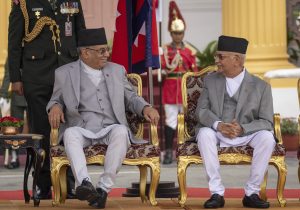Nepal’s newly appointed prime minister took the oath of office Monday at a ceremony in Kathmandu.
Khadga Prasad Oli, the leader of Nepal’s largest communist party, was named prime minister on Sunday following the collapse of a previous coalition government.
Oli, 72, will be leading a coalition government made up of his Communist Party of Nepal (Unified Marxist Leninist) and the Nepali Congress party, the two largest parties in Nepal. This is his fourth time serving as prime minister of the Himalayan nation.
Two deputy prime ministers and 19 ministers appointed by him also took the oath of office. He is expected to further expand the Cabinet, including members from coalition partner parties.
The last government headed by Pushpa Kamal Dahal collapsed on Friday after Oli’s party, which had been part of the coalition, withdrew its support to join the new partnership.
Oli will have to seek a vote of confidence in parliament within a month to continue in office. The two parties in the new alliance have more than half the members in parliament, giving them enough votes to pass a vote of confidence.
Oli’s biggest challenge as prime minister will be balancing Nepal’s relationship with its giant neighbors India and China, as both seek to wield influence over the small nation. Landlocked Nepal is surrounded by India on three sides and imports all of its oil and most supplies from India. It also shares a border with China.
“Among other challenges, the new government has the task to re-establish Nepal’s diplomatic credibility and balance between the powers in the north (China) and south (India),” said Bhoj Raj Pokhrel, an independent analyst.
Relations between Nepal and India had sunk to their lowest level during Oli’s first term as prime minister in 2015, when India was unhappy with a new constitution adopted by Nepal.
India imposed an unofficial economic blockade on Nepal, blocking supplies of oil, medicine, and other goods that created severe shortages in the country. But relations calmed after Oli visited New Delhi in February 2016.
Oli was credited with opening doors with China and boosting trade and joint infrastructure projects including a highway through the mountains. Oli’s relations with China have annoyed New Delhi.
Oli was born in a village in east Nepal and has been involved in politics since he was young.
He worked his way up the ranks of the communist party and was jailed for a total of 14 years for opposing the autocratic rule of Nepal’s monarchs. The royals banned political parties until 1990, when street protests forced then-King Birendra to hold free elections that turned Nepal into a constitutional monarchy, which was formally abolished in 2008.
Oli has had two kidney transplants.

































